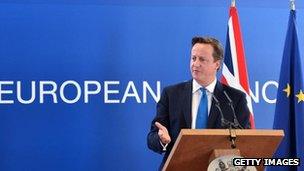Cameron facing EU budget dilemma
- Published

Mr Cameron has threatened to veto the 2014-20 EU budget
Some news stories are so old they write themselves.
I came to Westminster as a young reporter for the Times in the early 1990s and wrote many stories which began: "The prime minister was last night facing a fresh rebellion over Europe..."
Some colleagues copied intros like that into their computers so they could re-use them again and again.
So it is with an extreme sense of familiarity that I write that David Cameron is facing the possibility of a rebellion in the House of Commons this week over his approach towards the European Union's long-term budget.
I have been told that Conservative and Labour MPs are considering joining forces to insist that the prime minister should try to secure a cut in the EU budget.
The European Commission has proposed that the EU's overall budget for 2014 to 2020 should rise by 5% - and this has been backed by the European Parliament.
The government disagrees and says the budget should be allowed to rise just in line with inflation.
But this is still too much for many MPs who believe the money would be better spent in the UK.
Crucial question
The crunch will come on Wednesday evening when MPs debate the government's negotiating position for next month's EU summit where European leaders are hoping to fix the long-term budget.
The debate and vote has been arranged by the European Scrutiny Committee, external which forces the government to tell parliament of its broad strategy ahead of a big negotiation in Brussels.
Conservative backbenchers are expected to table amendments demanding the EU budget is cut.
"So what?" you might say. "The government will whip its troops into line in favour of a real terms freeze."
But the crucial question is what Labour does.
The party is officially in favour of cutting the EU budget. Shadow foreign secretary Douglas Alexander said as much last week but no-one seemed to notice.
He said: "Labour are clear that we want to see a real terms cut in the budget. Instead of wasting time managing his own backbenchers, the prime minister should be spending more time negotiating with EU partners to get this budget down."
So one option would be for Labour to back a Tory rebel amendment. Or they could table their own amendment - which the speaker would be obliged to select - and try to get as many Tories to back it as possible.
Suddenly the parliamentary arithmetic gets interesting and the new chief whip, Sir George Young, could face an early challenge.
Eurosceptic credentials
No firm deal has been done yet.
All will depend on discreet negotiations between Labour and Tory MPs early this week and the precise text of any amendments that are tabled.
Anything too partisan will ensure division and an easy win for the government. Anything bland enough to ensure cross-party support could lead to some sweaty ministerial palms.
For many Tory MPs, particularly those 81 who have already rebelled over Europe, voting for a cut would be an easy chance to re-establish their eurosceptic credentials with voters when many are uncertain of the Conservative party's approach to the EU.
For Labour, it would allow them to emphasise their fiscal responsibility, their commitment to making cuts in hard times, while outflanking the Conservatives on Europe at the same time.
Mr Cameron has threatened to veto any EU budget deal that goes further than a real terms freeze but achieving an absolute cut in cash terms is considered implausible by ministers and officials.
The difficulty for the prime minister is that it will be hard to argue against an absolute cut in EU spending when he is making the case for the same kind of cuts at home.